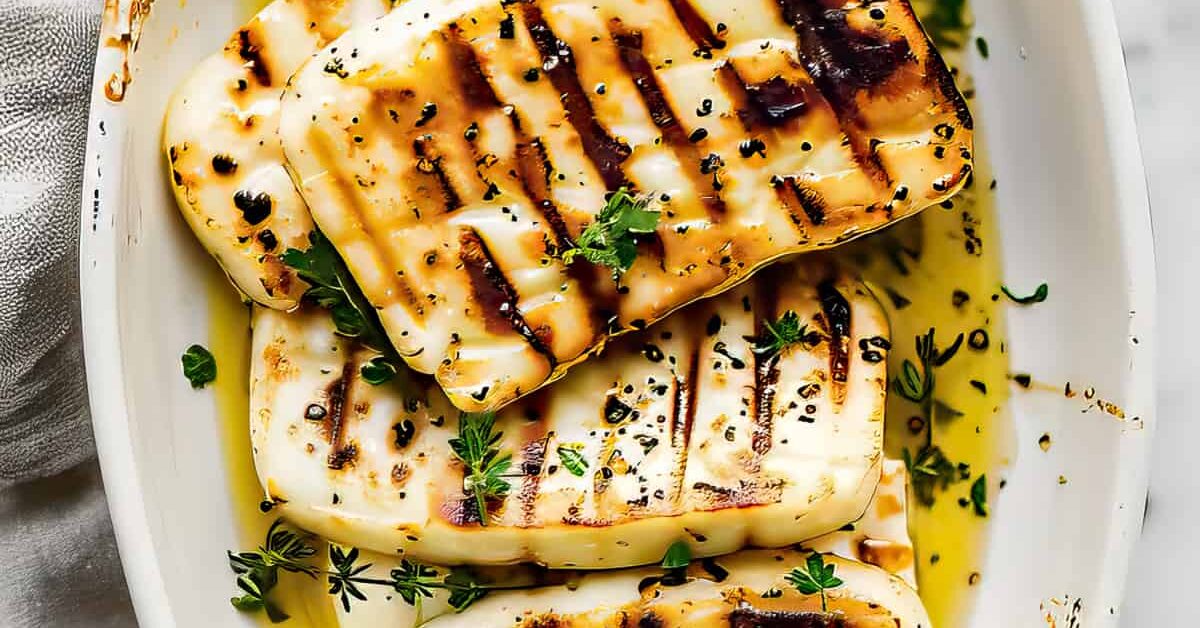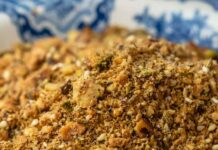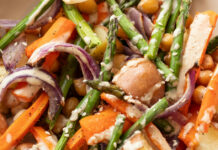There’s something magical about the marriage of salty, squeaky halloumi with sweet, juicy summer peaches — especially when both are kissed by flames on the grill.
But when you introduce RoboFood Dukkah Seasoning into the equation, this simple pairing transforms into an elevated, aromatic experience that captures the essence of Middle Eastern cuisine with minimal effort.
These Grilled Halloumi and Peach Skewers with Mint Labneh are not just a feast for the palate, but a celebration of texture, temperature, and spice.
Perfect as an appetizer at a dinner party, a centerpiece for a vegetarian spread, or a standout dish at your next summer barbecue, they offer restaurant-quality impact in under 30 minutes.
Why This Recipe Works
This recipe is designed to showcase RoboFood Dukkah Seasoning in a way that highlights its complexity while keeping the cooking process approachable.
Dukkah, traditionally a dry condiment used for dipping, takes on a new role here — as a dynamic crust that adds nutty crunch and earthy warmth to grilled halloumi.
By combining it with the natural sweetness of grilled peaches and the cool creaminess of labneh, each bite delivers a symphony of contrasting yet harmonious elements.
The grilling method (as opposed to roasting or pan-frying) builds on the aroma of toasted nuts already present in the Dukkah blend.
The open flame enhances the sesame and cumin notes, deepening the overall flavor profile.
This is not only different from typical Dukkah applications — it’s a bold reinvention that aligns with modern Mediterranean grilling trends.
Ingredients & Their Roles
Let’s break down the key components of this dish and why each one matters:
- Halloumi cheese: This semi-hard, brined cheese from Cyprus holds its shape under heat and develops a golden crust when grilled. Its high melting point makes it ideal for skewering and grilling.
- Ripe peaches: Choose freestone peaches for easier cutting. When grilled, their sugars caramelize, developing a jam-like richness that pairs beautifully with the savory elements.
- RoboFood Dukkah Seasoning: The star of the show. This ready-made blend of toasted hazelnuts, sesame seeds, coriander, cumin, and sea salt adheres perfectly to the oil-coated halloumi, creating a fragrant, crunchy exterior.
- Extra virgin olive oil: Used sparingly to help the Dukkah stick and encourage browning without overwhelming the dish.
- Labneh: A strained yogurt cheese with a thick, creamy texture and tangy flavor. It serves as a cooling counterpoint to the warm skewers.
- Fresh mint: Adds brightness and aromatic lift to the labneh, complementing the herbal notes in the Dukkah.
- Lemon zest: A subtle pop of citrus that elevates the entire dish without adding acidity.
- Wooden or metal skewers: For assembly. If using wooden ones, soak them in water for 30 minutes to prevent burning.
Step-by-Step Preparation
Step 1: Prepare the Mint Labneh
Start by preparing the sauce, as it benefits from a brief rest in the refrigerator to meld flavors.
In a small bowl, combine 1 cup of labneh (store-bought or homemade) with 2 tablespoons of finely chopped fresh mint, the zest of half a lemon, and a drizzle of olive oil.
Stir gently and season with a pinch of sea salt.
Cover and chill for at least 20 minutes to allow the flavors to integrate.
If you don’t have labneh, you can substitute with thick Greek yogurt or even ricotta that has been drained in cheesecloth for a few hours.
The goal is a dense, creamy base that won’t run when the skewers are served.
Step 2: Assemble the Skewers
Cut the halloumi into 1-inch cubes.
Slice the peaches into wedges, removing the pit.
Alternate threading halloumi and peach pieces onto skewers, leaving a small space between each for even cooking.
Aim for 3–4 pieces of each per skewer, depending on length.
Tip: Don’t overcrowd the skewers.
Proper airflow ensures even grilling and a nice char.
Step 3: Coating with RoboFood Dukkah
Place the assembled skewers on a tray.
Lightly brush each with olive oil — just enough to create a tacky surface.
Then, generously press RoboFood Dukkah Seasoning onto the halloumi cubes, ensuring full coverage.
The nuts and seeds in the blend will adhere best when the cheese is slightly oily but not dripping.
The beauty of RoboFood’s Dukkah is its balanced particle size — not too fine, not too coarse — making it perfect for crust formation.
No additional seasoning is needed; the salt and spice ratio in the blend is already optimized.
Step 4: Grill to Perfection
Preheat your grill to medium-high (around 400°F).
Place the skewers directly on the grates and grill for 2–3 minutes per side, turning gently with tongs.
The halloumi should develop golden-brown grill marks, and the peaches should soften slightly with visible sear lines.
Important: Avoid overcooking the peaches.
You want them warm and caramelized on the outside, but still holding their shape.
The heat will also gently toast the Dukkah, enhancing its nutty aroma.
Serving Suggestions
Transfer the skewers to a serving platter or individual plates.
Dollop a spoonful of chilled mint labneh alongside each skewer.
For an extra flourish, sprinkle the platter with pomegranate arils, a few extra mint leaves, and a light drizzle of high-quality olive oil.
These skewers pair beautifully with:
- Warm flatbreads or pita
- A simple arugula salad with lemon vinaigrette
- Grilled flatbreads brushed with za’atar and olive oil
- A crisp, citrusy white wine like Assyrtiko or Vinho Verde
Why This is a Game-Changing Use of Dukkah
Most Dukkah applications are subtle — a sprinkle over hummus, a dip for crusty bread, or a garnish for roasted vegetables.
But here, we’re treating it like a cuisine-forward crust, much like you’d use breadcrumbs or za’atar on chicken or fish.
The result is a bolder use of flavor that turns a humble cheese into a centerpiece ingredient.
RoboFood Dukkah Seasoning, with its balanced blend of toasted nuts, sesame seeds, and warm spices, becomes a flavor amplifier.
It bridges the gap between the creamy richness of halloumi and the bright sweetness of peaches, acting as the savory backbone of the dish.
Make-Ahead & Storage Tips
- The mint labneh can be made up to 2 days in advance and stored in an airtight container in the fridge.
- Skewers should be assembled and coated just before grilling to prevent the Dukkah from absorbing moisture and becoming soggy.
- Leftover grilled skewers (if any!) are best enjoyed immediately. Reheating can cause the halloumi to toughen and peaches to turn mushy.
Dietary Adaptations
This recipe is naturally vegetarian and can easily be made vegan with a few swaps:
- Vegan halloumi: Brands like Bute Island or自制 vegan versions using tofu and coconut oil can work well.
- Vegan labneh: Use a thick cashew or almond yogurt base, strained and seasoned the same way.
For a dairy-free, nut-free version, check the label of your RoboFood Dukkah — some blends contain nuts, but allergen-free versions may be available.
The Cultural Context of Dukkah
Originating in Egypt, Dukkah (pronounced “doo-kah”) is traditionally served in a small dish alongside bread and olive oil for dipping.
It’s a communal experience, often enjoyed at breakfast or as part of mezze spreads.
The blend varies by region — some include fennel, others use pine nuts or almonds — but the core ingredients remain toasted nuts, seeds, and spices.
RoboFood’s version honors this tradition while making it accessible for modern kitchens.
No grinding, no toasting — just open, sprinkle, and savor.
And yet, as this recipe proves, its potential extends far beyond the dipping bowl.
Final Thoughts
This Grilled Halloumi and Peach Skewer recipe is more than just a meal — it’s an invitation to experiment.
It shows how a traditional spice blend can be reimagined through modern cooking techniques, seasonal ingredients, and bold flavor pairings.
Whether you’re hosting guests, cooking for two, or simply treating yourself to something special, this dish delivers elegance with ease.
So fire up the grill, grab your jar of RoboFood Dukkah Seasoning, and let the aromas of toasted sesame, warm cumin, and caramelized peaches transport you to a sun-drenched Mediterranean terrace — no passport required.










